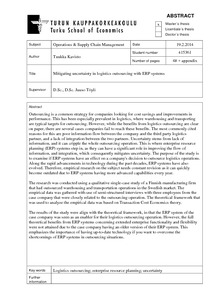Mitigating uncertainty in logistics outsourcing with ERP systems
Kavisto, Tuukka (2014-02-19)
Mitigating uncertainty in logistics outsourcing with ERP systems
Kavisto, Tuukka
(19.02.2014)
Julkaisun pysyvä osoite on:
https://urn.fi/URN:NBN:fi-fe2014041723407
https://urn.fi/URN:NBN:fi-fe2014041723407
Kuvaus
siirretty Doriasta
Tiivistelmä
Outsourcing is a common strategy for companies looking for cost savings and improvements in performance. This has been especially prevalent in logistics, where warehousing and transporting are typical targets for outsourcing. However, while the benefits from logistics outsourcing are clear on paper, there are several cases companies fail to reach these benefits. The most commonly cited reasons for this are poor information flow between the company and the third party logistics partner, and a lack of integration between the two partners. Uncertainty stems from lack of information, and it can cripple the whole outsourcing operation. This is where enterprise resource planning (ERP) systems step in, as they can have a significant role in improving the flow of information, and integration, which consequently mitigates uncertainty. The purpose of the study is to examine if ERP systems have an effect on a company's decision to outsource logistics operations. Along the rapid advancements in technology during the past decades, ERP systems have also evolved. Therefore, empirical research on the subject needs constant revision as it can quickly become outdated due to ERP systems having more advanced capabilities every year.
The research was conducted using a qualitative single-case study of a Finnish manufacturing firm that had outsourced warehousing and transportation operations in the Swedish market. The empirical data was gathered with use of semi-structured interviews with three employees from the case company that were closely related to the outsourcing operation. The theoretical framework that was used to analyze the empirical data was based on Transaction Cost Economics theory.
The results of the study were align with the theoretical framework, in that the ERP system of the case company was seen as an enabler for their logistics outsourcing operation. However, the full theoretical benefits from ERP systems concerning extended enterprise functionality and flexibility were not attained due to the case company having an older version of their ERP system. This emphasizes the importance of having up-to-date technology if you want to overcome the shortcomings of ERP systems in outsourcing situations.
The research was conducted using a qualitative single-case study of a Finnish manufacturing firm that had outsourced warehousing and transportation operations in the Swedish market. The empirical data was gathered with use of semi-structured interviews with three employees from the case company that were closely related to the outsourcing operation. The theoretical framework that was used to analyze the empirical data was based on Transaction Cost Economics theory.
The results of the study were align with the theoretical framework, in that the ERP system of the case company was seen as an enabler for their logistics outsourcing operation. However, the full theoretical benefits from ERP systems concerning extended enterprise functionality and flexibility were not attained due to the case company having an older version of their ERP system. This emphasizes the importance of having up-to-date technology if you want to overcome the shortcomings of ERP systems in outsourcing situations.
